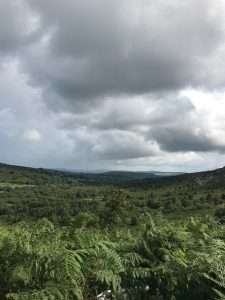An envelope filled with papers included school reports covering a decade from the closing years at primary school until the end of secondary school. Undistinguished for the most part, the comments on various subjects were probably a fair reflection of the effort expended.
The final year at secondary school was the worst in terms of effort, it was spent in a leisurely manner. Having passed the examinations required to go on to sixth form college a year early, 1976-77 was passed doing things that were interesting – the three examinable subjects were English literature, world affairs in the 20th Century and environmental studies. Each had its own attractions, but at a remote school in rural Devon in the mid-70s access to literature and the stuff of world affairs was not easy, so environmental studies became a passion.
There was no landscape or village that did not hide secrets that might be unearthed by someone who looked hard. To visitors, the Dartmoor National Park that surrounded our school was a place of unspoilt natural beauty, yet within a few steps of the roads that carried the coach parties there were granite hut circles that had formed the walls of houses in bronze age times and there was a wealth of industrial archaeology telling the story of human industry over the centuries.
It did not do to say it aloud, but human artefacts seemed far more interesting than natural history; flora and fauna had not the capacity to capture the imagination in the way that the ruins of a village, or the last traces of a tin mine, might. The granite rocks and versatile plants and hardy wildlife did not tell the stories of the people who found food and home and work among the rugged hills. Perhaps the sense of connection with those of foregoing generations was strengthened by the fact that the landscape was unchanged through the centuries, some of those whose handiwork had endured would still have recognised the place in which they had worked.
The endurance of artefacts through thousands of years of history was a lesson that the only part of our story that has lasted through time is stuff. A decade after leaving school, a conversation with a retired head teacher unexpectedly made such a point. After a career sufficiently distinguished for him to be included in a New Year’s Honours list, he had retreated to days at home and in the garden. The first weeks of the retirement had been spent building a stone wall where his garden adjoined the road, “building that wall was the most satisfying thing I have done in my life.” It was a comment that no-one could have anticipated, a comment that testified to the importance we attach to even the most humble and ordinary of the works of our hands.
